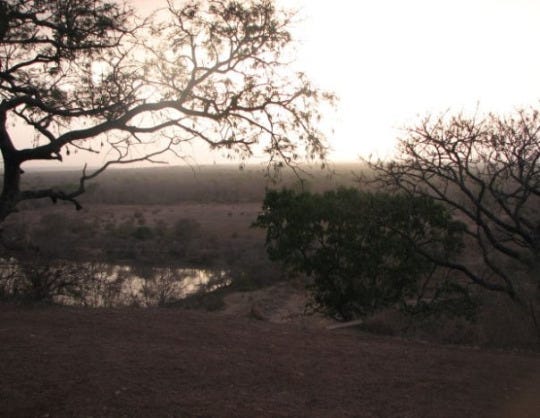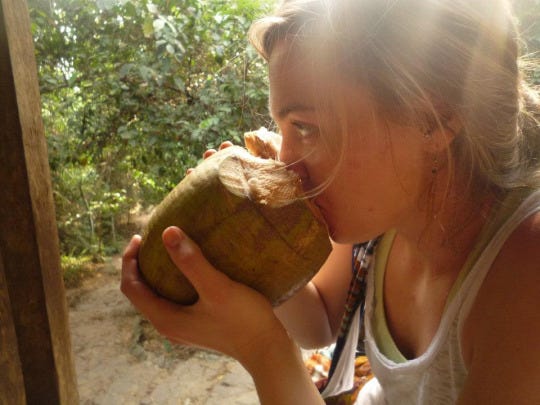Returning to Ghana
“It was the hardest thing that I have ever done, but also the best.” This is the mantra that I pilfered from the classmate whose host family lived in the same neighborhood as mine. The thirty minute walk to school each day functioned as my morning therapy session; it was a way to keep the rest of the day in perspective.
In the middle of our semester we began to think about what it was going to be like when returned. We were already getting questions from back home like, “SO, how is it? What’s it like?”
It was inevitable that upon our return, we would be asked countless times, “How was it?” As if there is some sort of answer to that question that would be situationally appropriate when asked by some acquaintance at a college party, or the distant relatives at the family reunion I attended two days after I got back. How do you take something so hugely important to you and boil it down to one or two sentences casually explained in a setting like that?
Quite simply, you can’t. Still, we did our best to prepare. My college roommate also talked me through this a little from halfway around the world, based on her own experiences. Through all of these conversations, that was the answer that I came to:
“It was the hardest thing that I have ever done, but also the best decision that I have ever made.”
I have uttered some variation of those words dozens, perhaps even hundreds of times. It astonishes me how often my semester abroad comes up in conversation, even now. Maybe it shouldn’t astonish me; isn’t this how it is with important things? The critical moments, by virtue of being critical, embed themselves into your daily activity in a plethora of ways.
Somehow, though, it stopped meaning what it used to mean. Or, more accurately, it stopped meaning anything. The sentence did what it was designed to: it shut the conversation off for the endless list of settings where I did not know how to have the conversation. The consequence was that spending so little time having this conversation eventually left me with only this empty little mantra.
Part of the problem, though, was not just what this experience meant to me, but what I had the right to discuss any of it at all. It should be no surprise that my recent struggles with the idea of telling the stories of others followed me to Ghana; indeed, the resurgence of that concern may well have been in part because that trip loomed on the horizon.
Before I left for my semester abroad, I had to deal with the constant. “Wait, where is Ghana?” questioning. Thus, I would return to these questions of what my time there was like knowing that for many people I spoke to, my answers might be the most significant encounter they have with information about this country. Suddenly telling stories felt terribly daunting.

This is not a responsibility that I felt entitled to, nor is it one that I particularly wanted. What do you say, then? How much of what affected me could I talk about, when I had to also be conscious of the way in which I was dictating someone else’s knowledge of an entire country? There were so many things that I did not feel comfortable discussing, simply because it seemed like an insult hurled in a litany of directions — to a country, to my professors, to my host family — to let some of these facts be core parts of anyone’s idea of what Ghana is, and what it looks like.
This is the very reason that the popularity of the gutter story horrified me so much. It’s a story about me, yes, so it’s mine to tell and it’s funny and har har. I don’t care about being painted as clumsy or stupid. I am definitely clumsy and I can often be ridiculously careless and, quite frankly, stupid. What troubles me about that story is that the landscape must be set and the only part of the landscape that needs to be presented is, “I was in Cape Coast, Ghana. The gutters are open and uncovered.” Perhaps some mention of the, uh, contents of those gutters might be important to the impact of the story. If I had the time and space to share only one story, is this what I should be conveying?
Being there with a friend I found myself telling her all sorts of things that I was not sure I had ever articulated to anyone outside my program. Suddenly it was all right because she was there — she could see it, and my words were nothing more than another perspective on a space that she was personally interacting with and experiencing.
It was a welcome relief. I didn’t even realize I’d been keeping some of those things to myself. It was also a good opportunity to talk through a lot of the issues I expressed in my last post in a setting that helped inspire much of that line of thinking.
Lest this convince you that I spent the entire trip obsessing, I can say that my trip back, in spite of its complicated moments (perhaps partially because of them), was an all-around positive experience. It was wonderful to be able to see my host family again, and eat red red and jollof, and ride tro tros. Even though I was there in a very different capacity, it also reminded me what I used to mean when I said that it was the hardest and best thing I have ever done.

It was nice to be in Not Paris for a little while. And then, in spite of my grievance with the cold, I returned to the same honeymoon period that Paris and I seem to have each time I get away for a bit.
Somewhere along the line I clearly stopped wanting to have that conversation that I started this post with, so I changed the subject. This is the part where I should go back and edit this for clarity and structure, but I’d rather not. That’s part of the beauty of telling my own stories; I can do with them as I please.